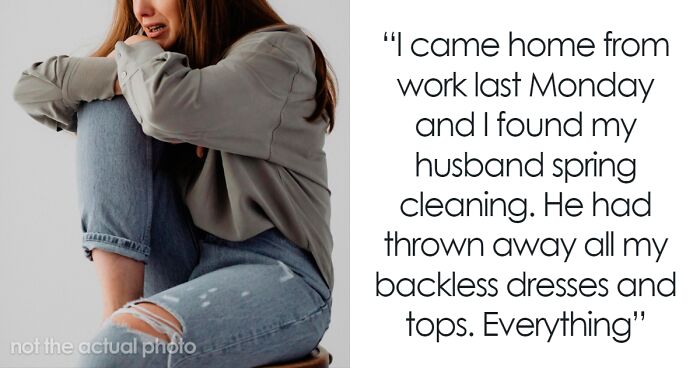
“I Feel Disrespected But Everyone Agrees With Him”: Husband Throws Out Wife’s Clothes
How we choose to dress is one of the easiest ways we can express ourselves. Whether your entire closet is black or everything you wear was inherited from your grandmother’s wardrobe, your sense of style says something about you. But according to one man, he should get to decide for his wife what her clothes will say.
A woman recently posted in the True Off My Chest subreddit detailing why her husband suddenly decided to throw away many of her beloved dresses and tops. Below, you’ll find the full story, as well as a conversation with Dr. Willard F. Harley, Jr., author and founder of Marriage Builders.
One of the best ways that we can express ourselves is through our clothing
Image credits: cottonbro studio (not the actual photo)
So this woman was heartbroken when she came home to find that many of her favorite pieces were gone
Image credits: Karolina Grabowska (not the actual photo)
Image credits: anon
“All decisions in marriage should be made with mutual enthusiastic agreement”
To gain more insight on this topic, we reached out to Dr. Willard F. Harley, Jr., author and founder of Marriage Builders. Dr. Harley was kind enough to have a chat with Bored Panda and discuss whether or not it is appropriate to tell your partner what to wear. “In my book, His Needs, Her Needs, I have a chapter on physical attractiveness that deals with that question. In general, a spouse should try to wear clothing that is attractive to the other spouse, but only if it’s done with ‘enthusiastic mutual agreement,'” he shared.
“My basic concept, the Policy of Joint Agreement, states that all decisions in marriage should be made with mutual enthusiastic agreement, or postponed until that agreement is reached,” Dr. Harley explained. “The only exception to the POJA is when the health or safety of a spouse is at risk to do nothing while trying to come to an agreement.”
“For example, he can’t tell her to wear nothing until they come to an agreement as to what she should wear. In this case, the husband should not have thrown out her clothing (violation of the policy of joint agreement), and he could not tell her what to wear instead (another violation of the policy of joint agreement),” the marriage expert says.
Dr. Harley says that any violation of the Policy of Joint Agreement means that many other decisions are likely to also be violations. “In my book, Love Busters, the first one that I identify is Selfish Demands: Telling your spouse what to do. Thoughtful Requests is the acceptable alternative where you ask for a change, and accept a denial of the request with a willingness to negotiate a reasonable alternative,” he explained. “Selfish Demands, and the other two that follow, Disrespectful Judgments and Angry Outbursts, are the three Love Busters that define abuse and control in marriage.”
Dr. Harley also recommended that this couple follow his “Four Guidelines for Marital Negotiation: 1) Make your conversation regarding the conflict pleasant and safe — no demands, disrespect, or anger; 2) Understand each other’s perspectives on the issue without judging those perspectives, 3) Brainstorm with abandon — what alternative solutions would be acceptable to both spouses (POJA), and 4) Implement the agreed-upon solution with a trial first to see if it works in practice. If it doesn’t work as planned, go back to brainstorming.”
Image credits: Samantha Gades (not the actual photo)
Controlling partners can often become dangerous
When you get married, it’s understood that you and your partner will share most things. You’ll split the finances, share responsibilities around the house, decide whose family you’ll visit on which holidays and agree on what kinds of meals you like to enjoy together. But despite the fact that you’ll always be working on the same team, you shouldn’t have to completely abandon your individuality for your marriage.
It can sometimes feel like you and your partner are morphing into the same person if you spend all of your time together and you have extremely similar interests, but it shouldn’t feel like that because they’re forcing it upon you. According to PsychCentral, one of the top signs that a spouse is being controlling is that they start making decisions for their partner.
This could be anything from making plans that involve you without asking first to redecorating parts of the home before consulting you. PsychCentral also provides the example of telling a partner how to dress or slowly changing their wardrobe by removing pieces they don’t like or adding in pieces they do like. Other trademark signs of a controlling partner are someone who criticizes, micromanages and invades their partner’s privacy.
Being in a relationship with a controlling partner can take a huge toll on a person. Marriage.com explains that it can cause emotional distress, isolation, limited independence, self-doubt, financial dependence, physical health issues, and the loss of identity. When someone you thought you loved starts making decisions for you, it can be difficult to draw the line and determine when enough is enough.
And unfortunately, a controlling partner who decides to police what their spouse wears won’t often stop there. Choosing Therapy warns that emotional abuse can be frightening because it can quickly snowball into more dangerous forms of abuse. Being controlling, possessive, verbally abusive and believing in strict gender roles are also factors that put someone at a higher risk of becoming physically abusive in their relationships.
Image credits: Karolina Grabowska (not the actual photo)
Everyone has the right to make their own clothing choices
Even if it feels like a small thing, having the freedom to choose what you wear is something we all are entitled to. HerNorm notes that your partner should never dictate what you get to wear because your body is yours. You are capable of making your own decisions, and you should be able to express yourself with clothing however you like.
Some days you might feel like wearing a flowy dress, and other days you might opt for sweatpants and a t-shirt. Wear whatever makes you feel comfortable; you shouldn’t feel like you’re constantly on the clock and required to wear a uniform for your partner. It’s also important to hold onto your identity, even in a marriage, so you don’t become resentful of your partner. If they start making every decision for you, you might start to forget who you really are or what your actual preferences are.
If your partner decides they want to control what you’re wearing, don’t be afraid to tell them that it’s not their place. You might ask how they would feel if you started telling them what to wear and help them understand why it’s inappropriate. But if they refuse to respect your boundaries, it might be time to reconsider the relationship.
We would love to hear your thoughts on this situation, pandas. Then, if you’re interested in checking out another Bored Panda article discussing similar themes, look no further than right here!
Image credits: Jackie Friedlander (not the actual photo)
Readers were quick to call out the husband’s toxic behavior and urged the woman to stand her ground
Poll Question
Thanks! Check out the results:
Let me get this straight. Husband is feeling insecure. He's worried that if OP looks "too sexy" and gets attention from other men, she might find someone "better." And his bone-headed idea is to go and PROVE that she absolutely deserves someone better.
She is too old to be told what she can and cannot wear. He is a mysoginistic p.r.i.c.k. and needs to be put in his place or gone.
Let me get this straight. Husband is feeling insecure. He's worried that if OP looks "too sexy" and gets attention from other men, she might find someone "better." And his bone-headed idea is to go and PROVE that she absolutely deserves someone better.
She is too old to be told what she can and cannot wear. He is a mysoginistic p.r.i.c.k. and needs to be put in his place or gone.

 Dark Mode
Dark Mode 

 No fees, cancel anytime
No fees, cancel anytime 























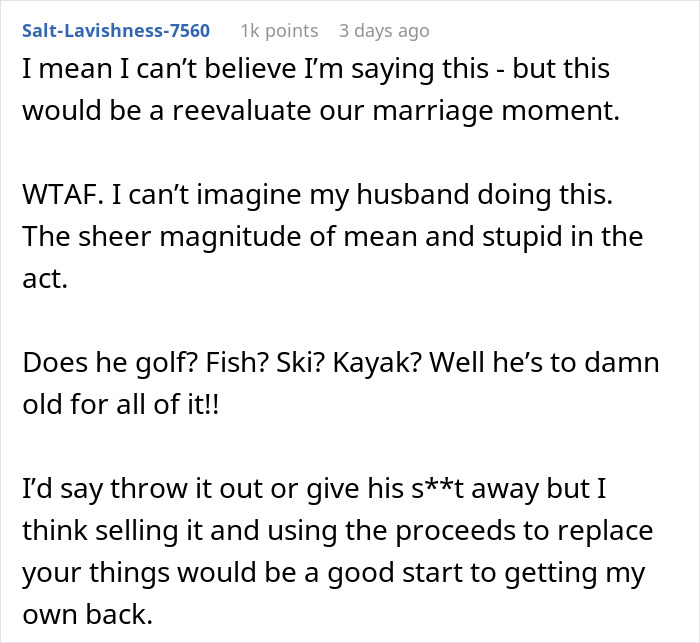


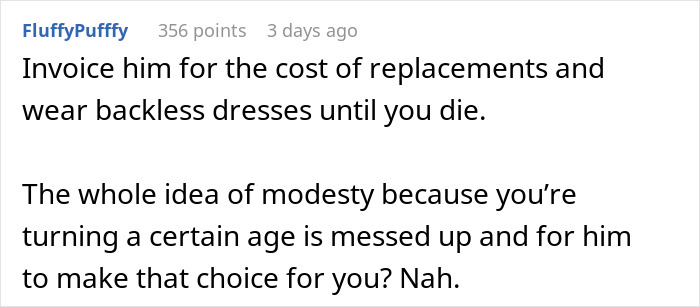
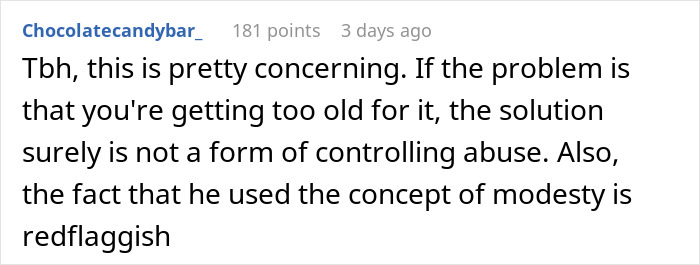


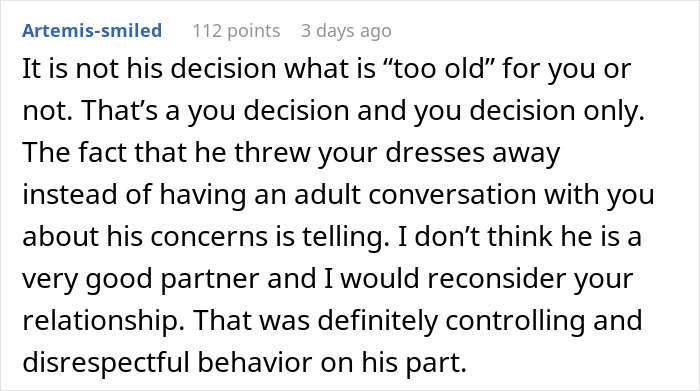
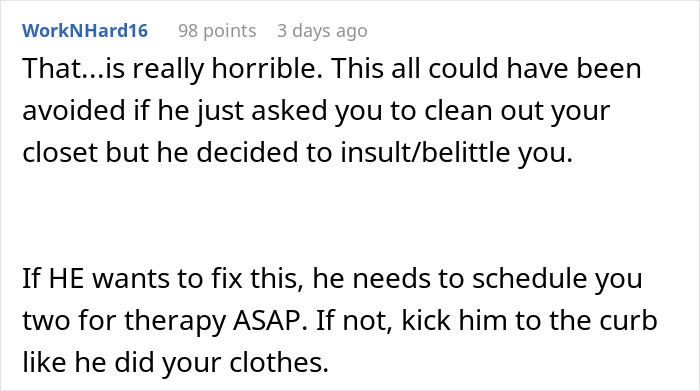
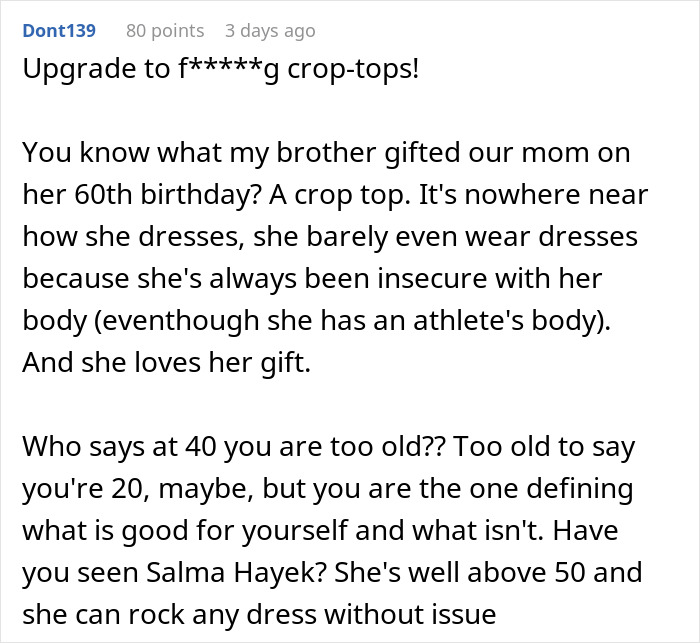




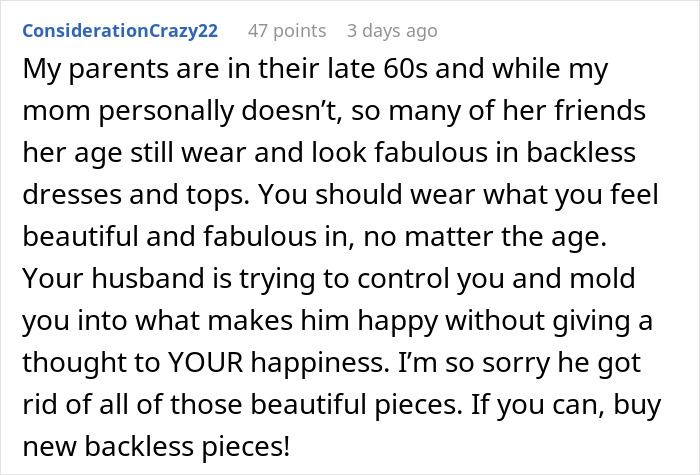













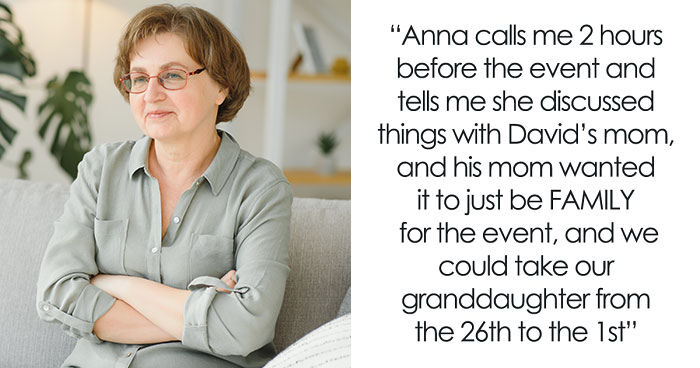


































54
49